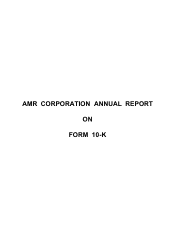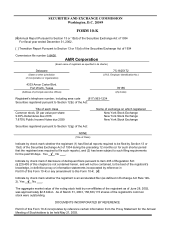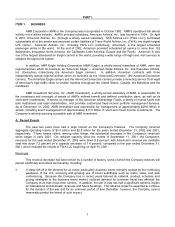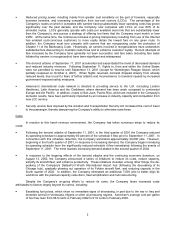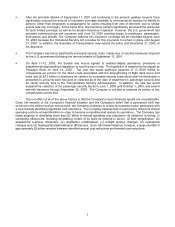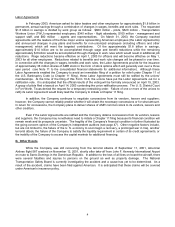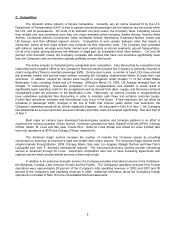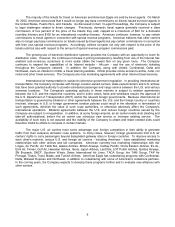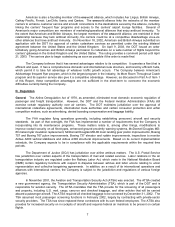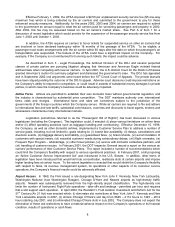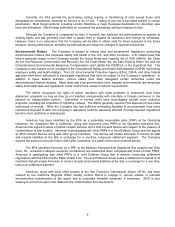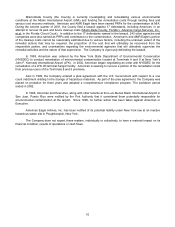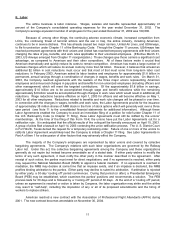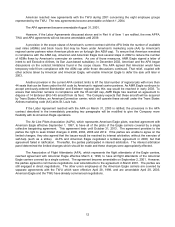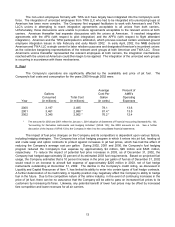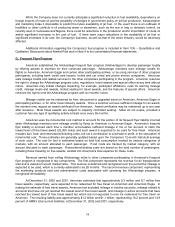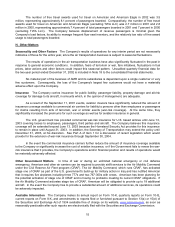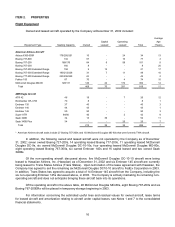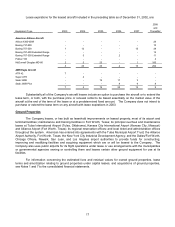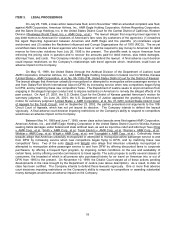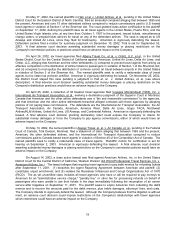American Airlines 2002 Annual Report Download - page 11
Download and view the complete annual report
Please find page 11 of the 2002 American Airlines annual report below. You can navigate through the pages in the report by either clicking on the pages listed below, or by using the keyword search tool below to find specific information within the annual report.9
Currently, the FAA permits the purchasing, selling, leasing or transferring of slots except those slots
designated as international, essential air service or Air 21 Act. Trading of any slot is permitted subject to certain
parameters. Most foreign airports, including London Heathrow, a major European destination for American, also
have slot allocations. Most foreign authorities do not permit the purchasing, selling or leasing of slots.
Although the Company is constrained by slots, it currently has sufficient slot authorizations to operate its
existing flights and has generally been able to obtain slots to expand its operations and change its schedules.
However, there is no assurance that the Company will be able to obtain slots for these purposes in the future
because, among other factors, domestic slot allocations are subject to changes in government policies.
Environmental Matters The Company is subject to various laws and government regulations concerning
environmental matters and employee safety and health in the U.S. and other countries. U.S. federal laws that
have a particular impact on the Company include the Airport Noise and Capacity Act of 1990 (ANCA), the Clean
Air Act, the Resource Conservation and Recovery Act, the Clean Water Act, the Safe Drinking Water Act, and the
Comprehensive Environmental Response, Compensation and Liability Act (CERCLA or the Superfund Act). The
Company is also subject to the oversight of the Occupational Safety and Health Administration (OSHA) concerning
employee safety and health matters. The U.S. Environmental Protection Agency (EPA), OSHA, and other federal
agencies have been authorized to promulgate regulations that have an impact on the Company's operations. In
addition to these federal activities, various states have been delegated certain authorities under the
aforementioned federal statutes. Many state and local governments have adopted environmental and employee
safety and health laws and regulations, some of which are similar to federal requirements.
The ANCA recognizes the rights of airport operators with noise problems to implement local noise
abatement programs so long as they do not interfere unreasonably with interstate or foreign commerce or the
national air transportation system. Authorities in several cities have promulgated aircraft noise reduction
programs, including the imposition of nighttime curfews. The ANCA generally requires FAA approval of local noise
restrictions on aircraft. While the Company has had sufficient scheduling flexibility to accommodate local noise
restrictions imposed to date, the Company’s operations could be adversely affected if locally-imposed regulations
become more restrictive or widespread.
American has been identified by the EPA as a potentially responsible party (PRP) at the Operating
Industries, Inc. Superfund Site in California. Along with numerous other PRPs at the Operating Industries Site,
American has signed a series of partial consent decrees and a final consent decree with respect to the cleanup of
contamination at that location. American is participating with other PRPs in a Joint Defense Group and has signed
an EPA Consent Decree along with other group members. The decree will enable American to resolve its past
and present liabilities at the Site in exchange for a one-time, lump-sum settlement payment. The Company
expects the decree to become final in 2003 after completion of a public notice and comment period.
The EPA identified American as a PRP at the Mattiace Petrochemical Superfund Site located near Glen
Cove, NY. American’s alleged volumetric contributions are substantial when compared with those of other PRPs.
American is participating with other PRPs in a Joint Defense Group that is actively conducting settlement
negotiations with the EPA and the State of New York. The Joint Defense Group seeks a settlement on behalf of its
members that will enable American to resolve its past and present liabilities at the Site in exchange for a one-time,
lump-sum settlement payment.
American, along with most other tenants at the San Francisco International Airport (SFIA), has been
ordered by the California Regional Water Quality Control Board to engage in various studies of potential
environmental contamination at the airport and to undertake remedial measures, if necessary. SFIA is also
seeking to recover its past costs related to the contamination from the tenants.

